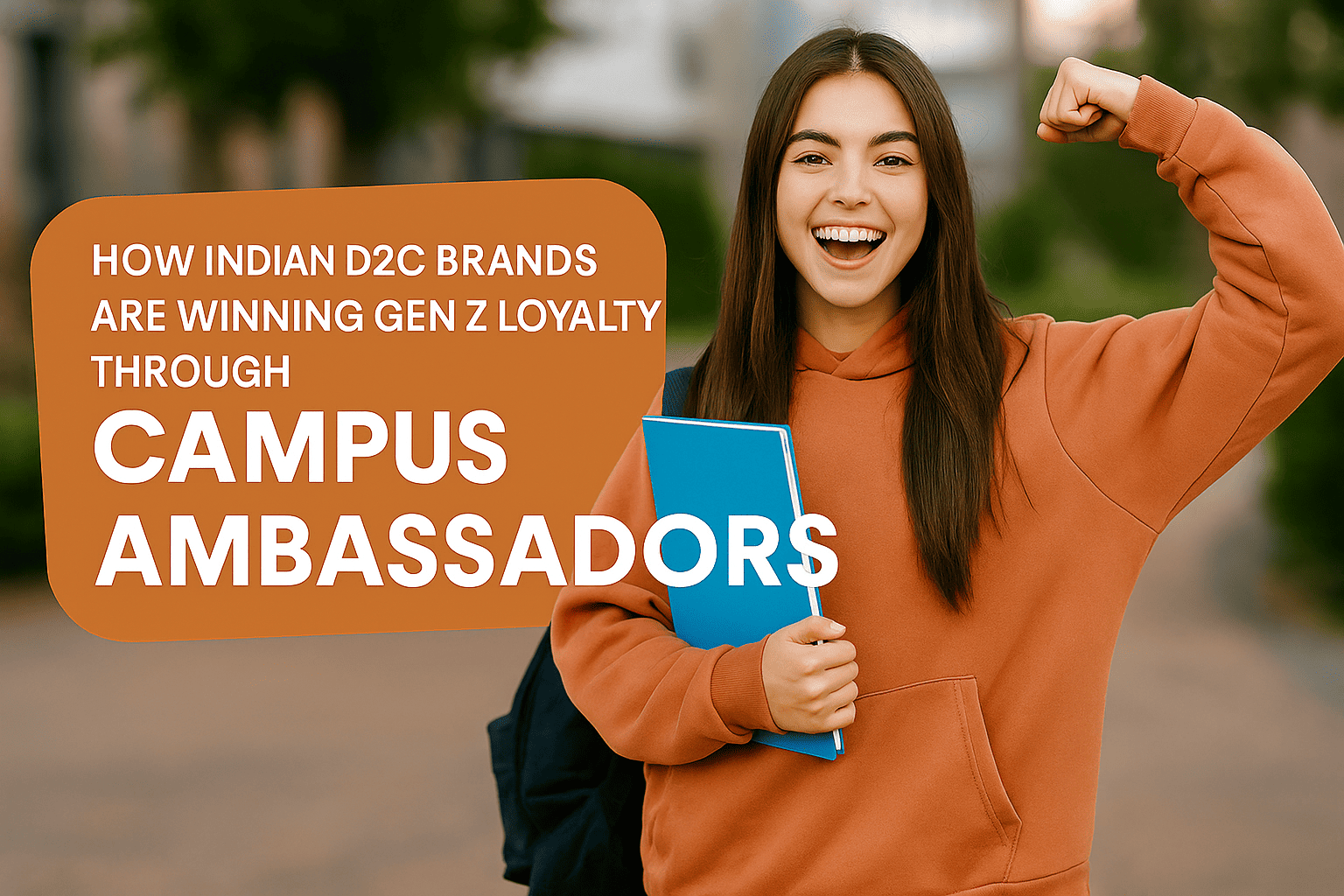Indian Direct-to-Consumer (D2C) brands are getting smarter, sharper, and more relatable in how they speak to India’s youngest and most influential buyer group: Gen Z. But flashy ads and one-off influencer collabs aren’t cutting it anymore.
The real game-changer? Campus Ambassador Programs in India.
These grassroots, community-first strategies are becoming the secret sauce behind many Indian startups building trust and loyalty with Gen Z inside colleges.
Let’s explore how and why.
Why Gen Z Loyalty is important for Indian D2C Brands

India’s Gen Z population, born between 1997 and 2012, is digitally native, socially aware, and highly influential within their communities—especially college campuses. For Indian D2C (Direct-to-Consumer) brands, cracking this demographic is not just a trend but a necessity.
- Buying Power: Gen Z contributes significantly to online consumption, especially in beauty, fashion, food, and wellness.
- Influence: A Gen Z student’s opinion often drives peer purchases within college ecosystems.
- Brand Switching: Gen Z consumers show lower brand loyalty unless brands consistently align with their values and preferences.
- Creator Trust: They trust content from creators and peers over traditional advertisements.
To win their loyalty, Indian startups are turning to an innovative tactic: the Campus Ambassador Program India model.
What Is a Campus Ambassador Program — and Why Now?
A Campus Ambassador Program in India involves selecting student influencers or micro creators across colleges to represent a brand, create content, and spread awareness among their peers.
Why it works now:
- Creator-first: The creator economy is booming among students.
- Community-first: Gen Z responds better to peer endorsements than top-down brand ads.
Key Differences From Traditional Influencer Campaigns:
| Traditional Influencer Campaigns | Campus Ambassador Programs |
| Short-term, one-off campaigns | Long-term brand-building |
| High-cost celebrity influencers | Low-cost, high-impact student creators |
| Centralized brand messaging | Hyperlocal, peer-driven communication |
Indian Brands Already Doing It Right
Mamaearth – Mom & Eco-First Content via Student Creators
Mamaearth leverages student influencer programs to create reels, testimonials, and tutorials highlighting their eco-friendly, toxin-free mission.
SUGAR Cosmetics – Campus-Level Tutorials and UGC Contests
SUGAR Cosmetics uses college influencer marketing by running makeup challenges and UGC (User Generated Content) contests in Indian universities, gaining both reach and content at scale.
Yogabar – Health-Focused Micro Influencers in Colleges
Yogabar taps into micro influencer India networks on campus to promote healthy snacking. Students share their fitness stories, diet routines, and healthy hacks featuring the brand.
Libas – Gen Z Ethnicwear Campaigns Powered by Creators
Fashion brand Libas has amplified its D2C game with regional influencer campaigns that pair ethnicwear with Gen Z’s cultural pride, led by campus creators.
Benefits of Campus Ambassador Programs for D2C Brands

1. Hyperlocal Reach
Your brand gets embedded in local college cultures through relatable faces.
2. Organic Content Creation
Student creators naturally embed your product into their daily lifestyle.
3. Long-Term Loyalty & Retention
Early engagement leads to long-term emotional connection.
4. Word-of-Mouth in College Circles
Peer credibility in campuses drives virality better than paid ads.
How to Build and Scale a Campus Ambassador Program
Launching a Campus Ambassador Program in India doesn’t need a massive budget — just a smart framework:
1. Creator Discovery and Onboarding
- Identify colleges by city, interest, and cultural relevance
- Use ambassador platforms or manual outreach
- Ensure diversity in language, region, and background
2. Content Briefing and Brand Training
- Host virtual brand orientation
- Share toolkits with visual guides, brand voice, hashtags
- Encourage them to share unique angles, not templated content
3. Approval + Reporting Workflows
- Use campaign dashboards for content approvals
- Track submissions, performance, and payouts
⭐ Tip: Tools like Sociocreator simplify all this with a brief-to-payment dashboard and pre-vetted creators.
Final Thoughts: Don’t Just Advertise to Gen Z — Empower Them
If you’re a D2C brand looking to grow in India, remember:
- Community > Campaign
- Loyalty > Impressions
The future of youth marketing in India is peer-led, trust-based, and campus-grown.
Launch your next campus campaign with creators who already have Gen Z’s trust.
FAQ (for SEO schema + PAA box)
What is a campus ambassador program in India?
It’s a student-led marketing model where college influencers represent and promote a brand within their campus community.
Do campus ambassadors help with brand awareness?
Yes. They build local brand awareness, drive organic content, and generate peer-driven trust.
Which Indian brands use student ambassadors?
Mamaearth, SUGAR Cosmetics, Yogabar, and Libas are among the top brands leveraging campus creators.
How do D2C brands market to Gen Z in India?
Through influencer campaigns, UGC challenges, and long-term campus ambassador programs focused on authenticity.
What’s the best platform to run a campus ambassador program?
Platforms like Sociocreator offer tools to discover, manage, and scale student creator campaigns effectively.

